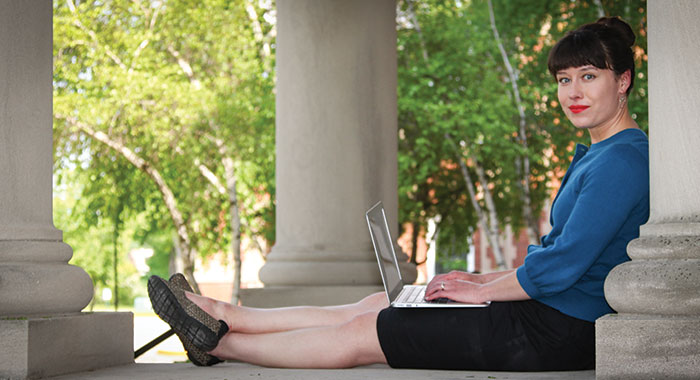Digital Fellow Keys in to New Role
When you’re the new kid in town, you can sit back and see what happens, or dive right in and take charge of your destiny. Kelsy Burke (Sociology) chose the latter.
Burke first came to campus for the 2013-14 school year. The sociologist was by no means a tech geek; her interest was in studying conservative Christianity as it intersected with gender and sexual politics in the United States. Yet when St. Norbert announced the creation of a digital fellowship – its inaugural faculty fellow position – Burke quickly applied for 2014-15, the inaugural year.
Why the interest? Burke is currently working on a virtual ethnography of the way in which evangelical Christians use the internet to promote sexual pleasure within marriage. The project began strictly as work on religion and sexuality, but when Burke became intrigued by related websites, she tweaked the project.
That meant she had to quickly learn how to create a website and online surveys; how to navigate chat rooms, and the unique vocabulary people use online. So when she heard about the new digital fellow position, she realized it would be perfect for her. The topic fit in with her research (her new book has since been accepted for publication by the University of California Press); she was interested in the use of technology in the classroom; and, as a new faculty member, she could use the position to get to know other faculty members with similar interests. Burke applied and got the job.
The new digital fellow position is aimed at faculty members who want to increase the use of technology as an aid in classroom instruction. Awardees are required to spend five to seven hours per week during the fall and spring semesters on initiatives like professional development sessions for colleagues on technology in the classroom, informal chats on the topic and faculty focus groups. At the end of the year, the professor must submit a report and program recommendations.
These requirements are fairly open-ended, so Burke was able to tailor the role to her own interests. “I found that our faculty members are very technologically innovative,” she says, “and for the most part are very receptive to technology if it’s something that enhances teaching.”
With her fellowship over, Burke gives the new program a thumbs-up. “For me, it was a great way to get to know the college,” she says. “And people now know me as someone interested in talking about technology and incorporating it into my teaching and research. I also now have a trajectory in how I would like to serve the college. This was just a really good way for me to find my place on campus.”
It also gave her some ideas to incorporate into her classes in the fall of 2015, most notably in a Special Topics course she’ll be teaching called Sociology of Cyberspace. Burke says she’s interested in using online message forums as part of her instruction, in addition to meeting in class. She’s pondering a “selfie” assignment, where students take selfies for a day or week to document their lives.
The project would then be studied under the social psychological concept of the “looking-glass self,” which says the way in which we understand our identity lies partly in how we think others perceive us.
July 3, 2015












